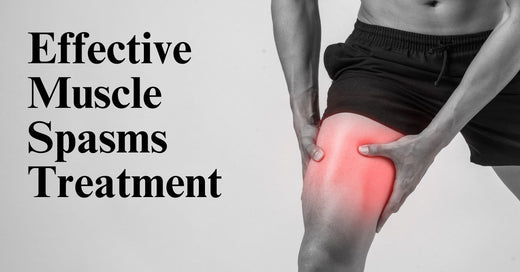
Effective Muscle Spasms Treatment
Share
Do you know about the treatments for muscle spasms? Let's find out some effective ones in this blog. Muscle spasms are quite common and unpredictable, but those painful cramps in the muscles happen often, and you can't control when they strike. Muscle spasms can happen in just one muscle or a whole group. You can get them anywhere in your body. Here are some of the most common types:
- Back spasm
- Arm spasm
- Leg spasms
- Neck spasms
- Chest spasms
- Abdomen spasms
- Rib cage spasm
Table of Contents
- What are the Primary Causes of Muscle Spasms?
- Diagnosis, Management, and Treatment for Muscle Spasms:
- Upper Back Muscle Spasms Treatment
- Treatment for Lower Back Muscle Spasms
- Treatment for Muscle Spasms Following Back Surgery
- Treatment for Neck Muscle Spasms
- Leg Muscle Spasms Treatment
- Treatment for Muscle Spasms in the Arms
- Stomach Muscle Spasms Treatment
- Treatment for Muscle Spasms in Dogs
- Conclusion:
- Frequently Asked Questions:
- 1. What is the best treatment for muscle spasms?
- 2. What is the main cause of muscle spasms?
- 3. What is the best medicine for spasms?
- 4. What is the best therapy for muscle spasms?
- 5. Does a deficiency of minerals and vitamins cause muscle spasms?
- 6. What are the preventive measures for leg muscle spasms?
What are the Primary Causes of Muscle Spasms?

Medical experts haven’t specified a definite cause for muscle spasms or cramps, but they have come up with some suggestions that are common in most cases. Let's have a look at those causes:
- Not doing enough stretching.
- Muscle fatigue can lead to tension.
- Exercise in extreme heat could give you heat cramps.
- Dehydration
- Having an imbalanced diet that doesn't provide the required amount of salts and mineral nutrients needed by our body.
- Putting too much stress on yourself
- Too much high-intensity exercise isn't good either.
Diagnosis, Management, and Treatment for Muscle Spasms:
Some people get muscle spasms quite often, and it's excruciating as well. Those who are prone to muscle spasms are athletes, infants, pregnant women, senior citizens, and obese people. In case of severe muscle cramps, one should consult a health practitioner and get a prescription for the right treatment, as it could be due to a neurological condition known as dystonia. There could be additional symptoms like sore muscles, weakness in the muscles, feeling paralyzed, numb spots, trouble with coordination, trouble sleeping, and vision problems.
Different people use different muscle spasm treatment methods to relieve the pain. However, not all of them are beneficial. No instant medication for muscle spasms has been developed yet. However, there are ways to alleviate pain, like moving around, stretching, massaging that area with hands or a massage roller, or applying cold or heat therapy for muscle spasms. Someone with painful cramps can get prescribed muscle relaxers or pain relievers from a health practitioner.
Upper Back Muscle Spasms Treatment
A person experiences upper back muscle spasms when the rhomboid muscles that connect the inner part of the shoulder blades to his/her spine are torn or strained for some reason. Other reasons could be dehydration, overuse of muscles, injury due to an accident, or sitting or sleeping in the wrong posture for long hours.
Most of the time, back muscle spasms could be treated with heat, an ice pack, or by simply stretching.
Treatment for Lower Back Muscle Spasms

Back muscle spasms can make you feel anywhere from a little uncomfortable and stiff to excruciating and tight, making it hard to move normally. They might also be a sign of something more serious going on. The most common reason for back muscle spasms is as follows:
- It could be because the muscles protect themselves from further strain by doing that.
- An underlying anatomical problem could be the reason, like facet joint osteoarthritis, degenerative disc disease, spinal stenosis, or a herniated disc. The cause of these symptoms needs to be treated, not just the symptoms.
Treatment for Muscle Spasms Following Back Surgery
Muscle spasms can happen when you stretch your muscles too much or don’t move around enough. You often see them after certain surgeries. They usually feel like cramping, squeezing, or pinching. To help with the pain, people often take a muscle relaxant like diazepam (Valium).
Treatment for Neck Muscle Spasms
There are several ways to treat neck muscle spasms at home. Some of these methods include:
- Neck stretches are considered one of the best ways to loosen up and relax your neck muscles.
- Another method is massaging your neck by either gently squeezing or moving your thumb in a circular motion.
- If your neck allows, you should do some light activity to keep blood flowing to your muscles.
- Take care of your stress level by doing yoga or meditation.
- We should keep our heads and bodies rightly aligned while sleeping.
- For instant relief, you can also take OTC pain medicines that alleviate pain and inflammation.
- One can also try heat {warm towel or bag} or cold {ice pack} therapy to get some relief.
If these home remedies are not working, one can ask his/her doctor or health practitioner to prescribe some muscle relaxants or steroid injections.
Leg Muscle Spasms Treatment
Simply going on a walk can help with leg cramps, but there are other ways to deal with it as well like stretching, massaging, or applying heat or cold packs. You can also prop your leg up or stand and press your feet against the floor to bring relief to your legs.
Treatment for Muscle Spasms in the Arms
The severity of arm pain depends on the cause, like spasms of the legs, Arm spasms can also be treated with hot or cold therapy, stretching, massage, compression bandaging for swellings, and staying hydrated. But if it's not curable through these home remedies, you can try other ways to alleviate pain, like acupuncture or chiropractic adjustments, by contacting your doctor or health practitioner.
Stomach Muscle Spasms Treatment
Abdominal pain could be caused by muscle strain, gas, or as a symptom of irritable bowel syndrome. Initially, one can use home remedies for abdominal cramps and spasms that are outlined below:
- Use a heating pad or warm bath to relax muscles.
- To release tension, gently massage the abdomen.
- Chamomile or ginger tea can soothe the stomach.
- You can replenish with sports drinks or bananas, but you have to be cautious with kidney issues.
- Over-the-counter options like ibuprofen or acetaminophen can help, but you have to use them carefully. These can alleviate spasms from gastritis.
- You can reduce activity to help with muscle strain.
- Certain poses may aid digestion and relieve gas.
For severe or persistent symptoms, other muscle spasms treatment might be needed, including antibiotics or medications for inflammatory bowel diseases. You should consult a doctor, especially during pregnancy, if symptoms worsen.
Treatment for Muscle Spasms in Dogs
If your dog experiences muscle spasms or cramps, ensure they stay hydrated and gently stretch or massage the affected areas. Heat or cold therapy can help alleviate spasms and pain. Consult your veterinarian about muscle relaxants or pain relievers, as well as nutritional supplements like vitamins, minerals, and electrolytes to support muscle health and healing.
Conclusion:
Muscle spasms are common and typically not a cause for concern, often resulting from over-exercising, dehydration, stress, or nutrition deficiencies. They involve involuntary muscle movements that can feel like twitches or painful cramps and could occur anywhere in the body. Spasms usually last from a few seconds to several minutes and go spontaneously. Muscle spasm treatment could range from stretching, massaging, or applying heat or ice packs for mild pain to surgery in cases of severe pain or a serious health issue.
Frequently Asked Questions:
1. What is the best treatment for muscle spasms?
Stretching is seen as the best treatment for muscle spasms by many. It is a simple remedy that doesn’t usually require a health practitioner. However, in the case of a complex problem, one can get help for better results.
2. What is the main cause of muscle spasms?
It is usually believed that dehydration and depletion of electrolytes cause spasms in many cases. Muscle cells need plenty of water, glucose, sodium, potassium, calcium, and magnesium to help their proteins work together and contract properly.
3. What is the best medicine for spasms?
Muscle relaxants are prescriptive medications for spasms and are divided into anti-spastic drugs, which reduce muscle tightness, and antispasmodic drugs, which prevent involuntary contractions. The choice of muscle relaxant depends on the pain's cause, side effects, and individual patient factors. Common administration methods include oral, intramuscular, intravenous, or intrathecal routes, with Baclofen, Tizanidine, and Diazepam being frequently prescribed. While generally safe for short-term use, these medications can cause side effects like sedation and drowsiness, so patients should discuss the risks with their healthcare provider.
4. What is the best therapy for muscle spasms?
Hot and cold therapy is good for spasms. For example, a hot water bag is relieving when one is having menstrual cramps. It alleviates the pain without having to take painkillers every month, which can impact the kidney.
5. Does a deficiency of minerals and vitamins cause muscle spasms?
A deficiency of calcium, potassium, magnesium, or vitamin D can cause muscle spasms. That's why it is important to sunbathe in the morning and avoid vitamin D deficiency.
6. What are the preventive measures for leg muscle spasms?
If you want to prevent leg spasms, stretch your muscles before you go to sleep. When you sleep, keep the blankets around your legs loose. To avoid leg cramps, prop your toes up with pillows if you sleep on your back. If you’re a stomach sleeper, let your feet hang off the end of the bed.
